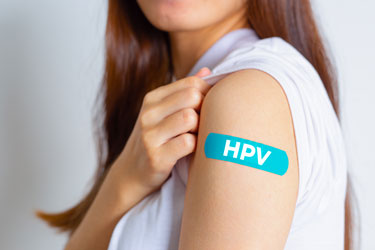Human Papillomavirus: Preventing the Cancers It Causes
by Holly Mitzel
March 2023
Living in times of the COVID-19 virus, it's easy to overlook the other viruses that have serious impact on the human body. For example, last year another virus, the human papillomavirus – known as HPV for short – caused cancer in 85 North Dakota women and men, according to the Centers for Disease Control and Prevention.
Public health experts know that about 8 of every 10 people will get an HPV infection in their lifetime. That's a lot of people that could get an HPV-linked cancer, including those 85 North Dakotans. One HPV-linked cancer is cervical cancer, the cervix being part of a woman's womb. Other cancers are in intimate areas, like the rectum and, in men, the penis. HPV is also responsible for some throat and mouth cancers.
 Because providers don't
have a good way to detect HPV-linked cancers before they
are visible, doctors recommend a prevention attack on
HPV: getting a shot against it, commonly referred to as
getting vaccinated or immunized. Fortunately, the HPV
vaccine has been around for almost 20 years and has a
track record of doing its job. Doctors have learned that
HPV vaccination is capable of preventing more than 90% of
HPV cancers from even developing.
Because providers don't
have a good way to detect HPV-linked cancers before they
are visible, doctors recommend a prevention attack on
HPV: getting a shot against it, commonly referred to as
getting vaccinated or immunized. Fortunately, the HPV
vaccine has been around for almost 20 years and has a
track record of doing its job. Doctors have learned that
HPV vaccination is capable of preventing more than 90% of
HPV cancers from even developing.
For anyone interested in getting the cancer-preventing HPV vaccination, it's important to understand that like many other childhood vaccines, it's given in a series early in life in order to offer the best protection before skin-to-skin virus exposure even happens. Shots can start between ages 9 to 15.
Doctors know there is some misunderstanding around the HPV vaccination. For example, the myth that only girls need the HPV vaccine because of cervical cancer risks. While boys cannot get that specific cancer, they can get the other HPV-related cancers. Some parents and teens still worry that the vaccine is unsafe. The HPV shot now has a 20-year track record of safety. The HPV shot is given in the arm or buttock muscle and, like most vaccines, there can be pain or swelling at the shot site for a few hours or even a few days. For some, fever, joint pain, or an upset stomach might also occur.
It's sometimes hard to keep health information straight about what viruses do which things to the human body. For HPV, it's clear. It can cause cancer. But remember, there is a safe vaccination that can decrease HPV's strong tendency to cause cancer. For that reason, it's an important option for the people in the Dickinson area to know about.
This article also appeared in the March 1, 2023 issue of the Dickinson Press.
About the Author
 Holly Mitzel is a third-year medical student at
the University of North Dakota School of Medicine &
Health Sciences. She was selected as the Dickinson
participant for the school's ROME program, or Rural
Opportunities in Medical Education. The program focuses
on teaching student doctors the importance of rural
newspapers as a way to share health information. As a
future rural healthcare leader, Mitzel has written this
column to provide health information for her ROME
community. The information is not for diagnosis or
treatment and should not be used in place of previous
medical advice provided by a licensed practitioner.
Holly Mitzel is a third-year medical student at
the University of North Dakota School of Medicine &
Health Sciences. She was selected as the Dickinson
participant for the school's ROME program, or Rural
Opportunities in Medical Education. The program focuses
on teaching student doctors the importance of rural
newspapers as a way to share health information. As a
future rural healthcare leader, Mitzel has written this
column to provide health information for her ROME
community. The information is not for diagnosis or
treatment and should not be used in place of previous
medical advice provided by a licensed practitioner.
